As she looks ahead to her sports debut at next year's Tokyo Olympics, 18-year-old Caroline Marks is determined to push the progression of surfing, particularly for women.
SAN CLEMENTE, Calif. — On a weekday evening in mid-October, 18-year-old Caroline Marks is padding barefoot along the volleyball-size stones at Lower Trestles in south Orange County, a renowned surf spot not far from her house. There is no one else in the water. The sky looks like spilled orange paint. The pandemic and other human concerns don’t reach this secluded beach, but Marks and her five-foot plank of foam and fiberglass come here every day to hone her craft of carving waves better, at a younger age than any woman in history.
Into the roaring surf she paddles, the model of a new American archetype: the little sister of brawny brothers she quickly surpassed in athletic prowess if not in physical size. About 12 years ago, Marks was riding horses or dirt bikes with siblings Luke and Zach in their pine-needle-covered backyard in Melbourne Beach, Fla., or shooting hoops with them, the Atlantic Ocean lapping at the sand nearby. At eight she received her first surfboard, a battered hand-me-down from Luke, the best surfer in the family at the time. “I left all his stickers on,” Marks recalls. “I felt so cool.”
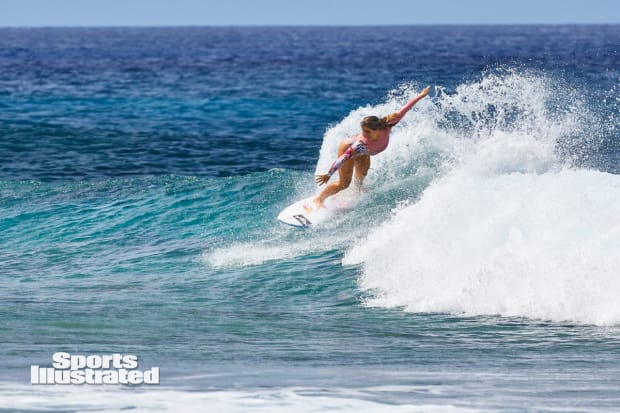
Her parents, Darren and Sarah, can still see that little-girl version of Caroline if they close their eyes long enough. Desperate to win her brothers’ approval, she abandoned a promising future in horseback barrel racing in favor of getting pummeled by the erratic Florida whitewater more times than they care to remember. Today, the ocean is on the west side of the photograph, not the east, and that salt-streaked girl is a young woman, world-class in her sport, the youngest surfer to ever qualify for the women’s World Championship Tour, and a member of the U.S. Olympic team for Tokyo next summer.
The years in between seem like a blur.
Luke and Zach were her first role models, along with Kelly Slater, the most decorated competitive surfer in history, who grew up in nearby Cocoa Beach, Fla.
As a child, Marks was also inspired by Serena Williams, Simone Biles and Lindsey Vonn, “girls I just thought were super gnarly,” she says. “They were just so into what they were doing. That's where the best surfers come from, too. They just genuinely love surfing.”
That’s how Marks explains her rise to surfing’s pinnacle. Her secret doesn’t lie in her wave selection or her low center-of-gravity or her spider-like balance. “I think it’s just, I love surfing. I’ll surf eight, 10 hours a day, just because I love it.” If the 10,000-hour rule is in fact a thing, Marks crossed that threshold of predictive greatness before she reached driving age.
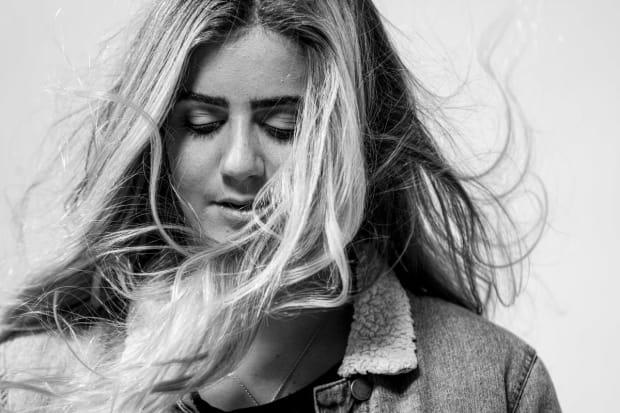
Her passion became her career at the under-12 U.S. championships in 2013, one of the first contests she entered. She stunned the field, claiming a championship trophy nearly as tall as she was, while her six siblings and her parents, Darren and Sarah, hooted their support from the nearby dunes. “That’s when I realized, this is what I want to do for the rest of my life,” Marks says. “That was the light bulb moment for me. When my brothers said, You're going to be something special, I knew I was onto something because they were usually so critical of me.”
That landmark moment occurred at Lower Trestles, which helps explain the Marks family’s decision to move here, from Florida, shortly afterward. The family went all in on Caroline's fledgling surfing career. Not because an Olympic bid might result from it, but because pursuing excellence in the sport had become her oxygen. There were no other paths forward. Today, their home sits on a cliff from which Caroline can see whether there are any worthwhile swells amassing offshore.
About two years ago, a different kind of wave, which had been quietly gathering momentum during her adolescence, crested and rolled onto shore. Marks first heard about the WSL’s new equal pay policy for male and female surfers during a visit to Slater’s “Surf Ranch” in Lemoore, Calif., an inland desert where the 11-time world champion had constructed a massive pool that churned out wave after rideable wave. Marks’s first pro victory came the following April, in Australia, at the Pro Gold Coast championship. “I’ll never forget it,” Marks says. Not only did she upset seven-time world champ Stephanie Gilmore, but her win marked the first time in surfing history that men and women were paid the same share of prize money.
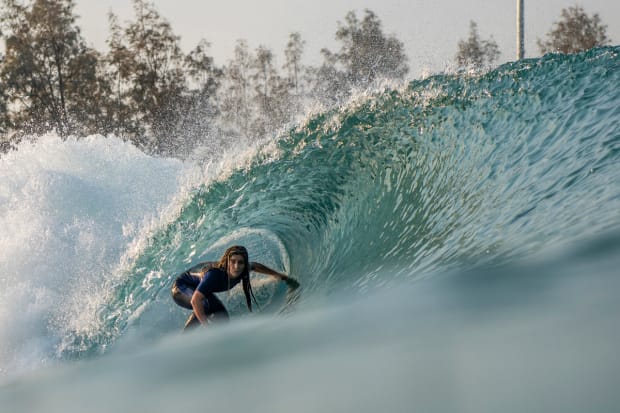
The milestones kept coming. When Marks finished second in the WSL standings last December, she secured a spot on Team USA at the Tokyo Games, where surfing will make its Olympic debut. “I started surfing because I just wanted to impress my brothers and wanted them to think I was cool,” Marks chuckles. “Then it just kind of took off.”
She typifies the wisdom of her generation. Those born after the turn of the millennium place less value on how much they know than on their ability to identify the old and outmoded. Asked whether she considers herself a leader in women's empowerment, Marks pauses. “I don't think about it,” she says. “I guess because—I just think we’re equal. Like, why can't you go on that big wave? Why can a guy do that and not a girl? You just have to go out there and do it.”
Earlier this year, on her 18th birthday, she trekked to Tahiti for the first time to test herself against the legendary water mountains at Teahupo’o. “You watch all these videos and you're like, It's the scariest wave ever. But then you just have to go out there and show yourself that you can do it. Girls are kind of doing more of that. They're just going out there and doing it because—why not?”
It’s the reason she sits straddling her board at Lower Trestles as the sun sinks behind the horizon, waiting for the next set to roll in. “My goal as a surfer, especially as a female surfer,” she says, “is to be that girl that pushed the progression of women's surfing. Carissa Moore, Lisa Anderson, Stephanie Gilmore—those are the girls who pushed the sport before me. And I want to be the next generation that's leading the way to surfing bigger waves and getting barreled more, and doing airs ... That’s my goal every day when I go surfing: to constantly push myself.”
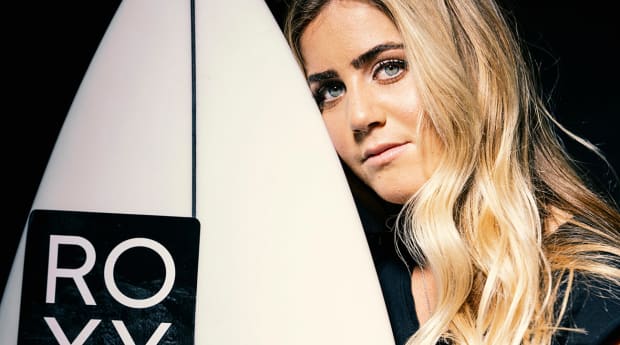
The stage is set for Marks to be an ambassador for the sport in Tokyo next summer, on the Olympic stage, with her American teammate and fellow medal favorite, Moore. “It's something I've dreamed about,” she says. “[The Olympics] is one of the only things that brings the whole world together.” The timing is also fortuitous in light of the bump in popularity surfing has seen during the pandemic. Behind the devastating effects of the coronavirus, an opportunity rose for legions of surf novices to exercise and enjoy the outdoors while receiving a power wash from Mother Nature.
Marks has always found respite there. “No matter what's going on in the world, [surfing] is my happy place,” she says. “The ocean is therapeutic to me.”
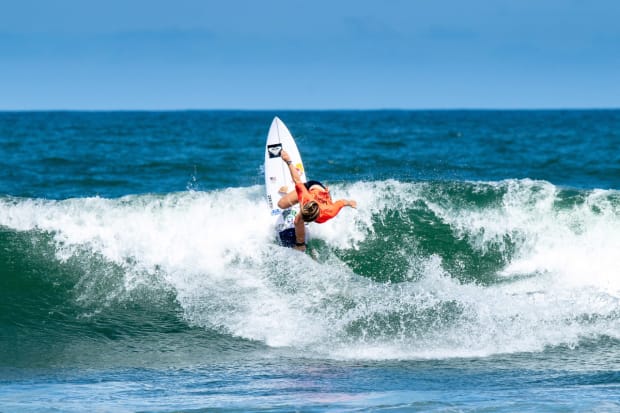
She knows competitive swimmers her age who complain of “having to stare down at a line at the bottom of the pool all time. With surfing, every wave is different and it's constantly changing. There are so many different waves in the world and you're always exploring and learning about the ocean. It’s a sport you can never master. That's why you see people surfing ‘til they're old … It’s why this will never feel like a job to me.
“It’s like painting a picture. It's an open canvas and no one can tell you what to do.”
Her palette adds new colors all the time. She’s in no rush to finish her brushwork, which she began on one American coast and has resumed on the other. Everyone in between can enjoy her artistry, if they so choose. All are invited. Everyone in the world is.